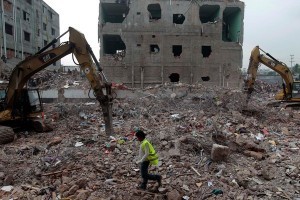Under mounting pressure to improve working conditions in Bangladesh’s garment factories, several of the world’s largest apparel companies agreed on Monday to a landmark plan to help pay for fire safety and building improvements after the collapse last month of the Rana Plaza factory complex, which killed more than 1,100 people
The agreement, hailed by labor and consumer groups as a major breakthrough, came as the Bangladeshi government also took steps to respond to the April 24 disaster at Rana Plaza outside Dhaka, the Bangladeshi capital. In the last two days, the government has pledged to raise wages for garment workers and change labor laws to make it easier to form trade unions.
The parallel announcements by global brands and the Bangladeshi government were a significant shift: For years, Bangladesh has seen some of the worst practices in the global garment industry. Wages are the lowest in the world, starting at roughly $37 a month. Factory conditions are often unsafe. Yet global brands have often sought to deflect any direct responsibility for the problems, while the government has often been tepid in protecting worker rights.
I – Word Understanding
Landmark plan – a very important plan
Hailed – welcomed with praise or enthusiasm
Breakthrough – an important achievement
Deflect – to turn aside (deviate)
Tepid – not energetic
II – Have your say
1.Millions of children are employed in different industries in Bangladesh.
The garment industry employs the most children. Children as young as 8 years old are reportedly working in factories.
2.In Bangladesh, it only costs $3.72 to make a denim shirt that would cost $13.22 if made in the U.S.
3.3. Bangladesh said its garment workers would be allowed to form unions without seeking permission from factory owners.



